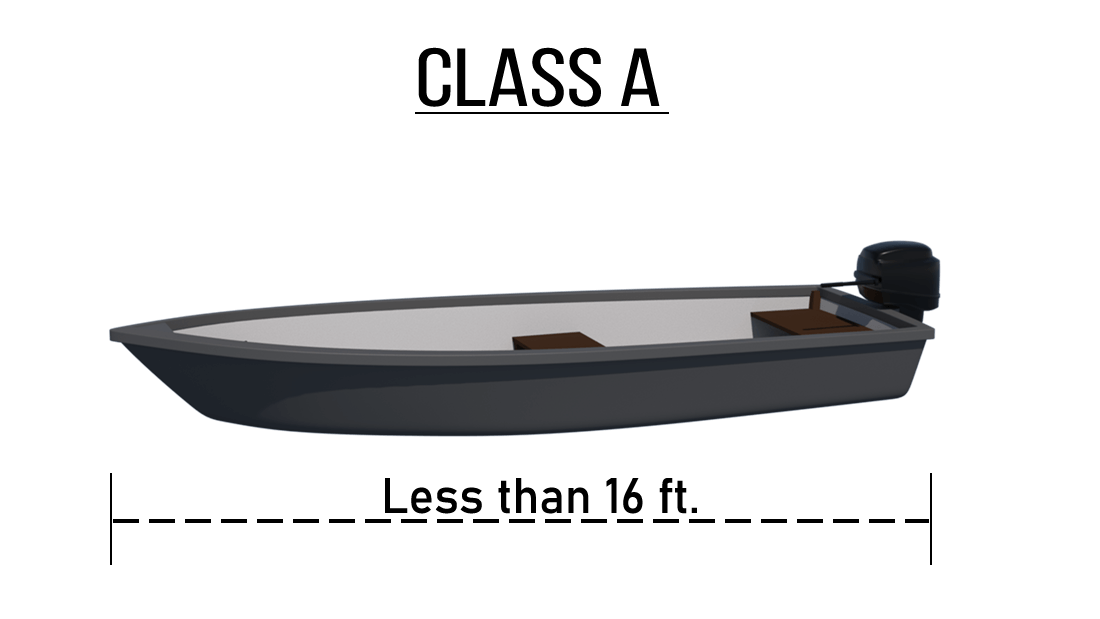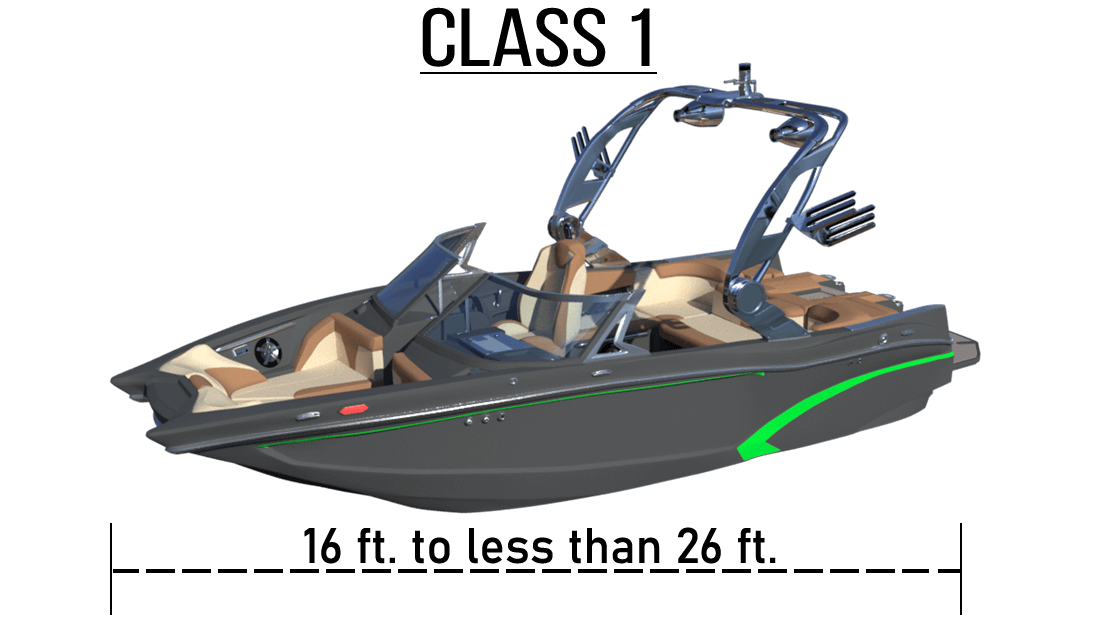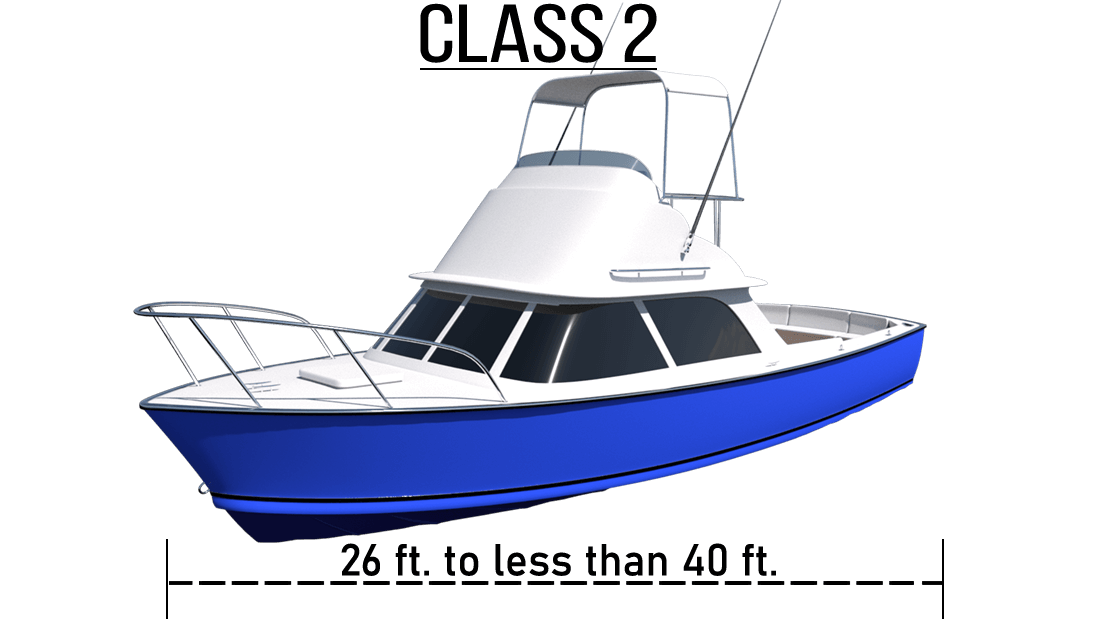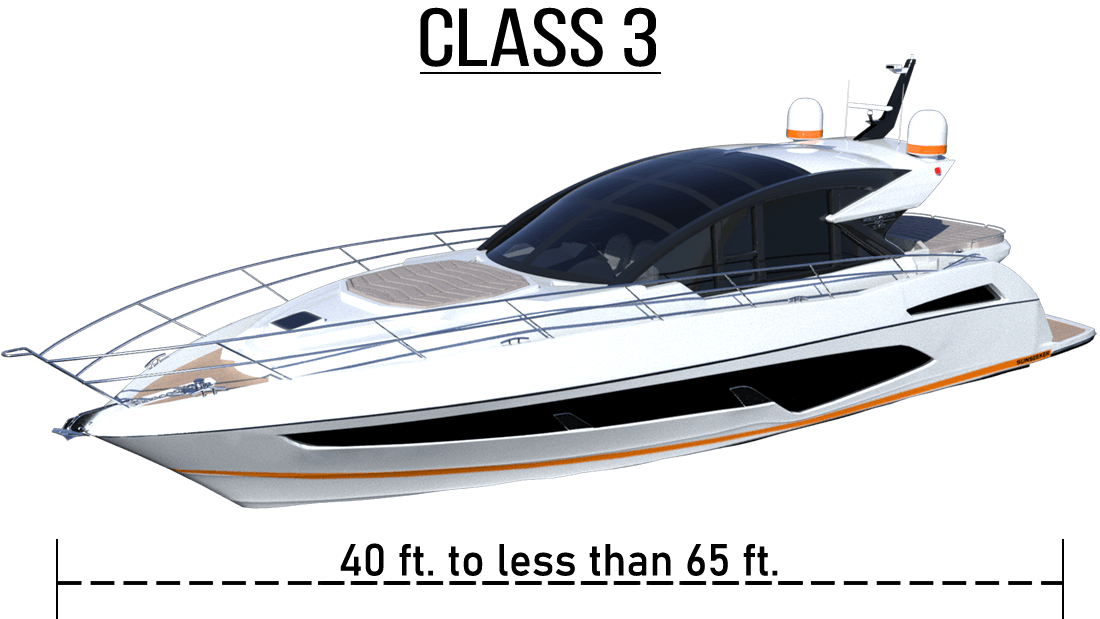California Required Boat Safety Equipment - Regulations

California law requires that you have specific safety equipment on board depending on the class of your boat.
Boat classes are determined by boat length:
Motorboats Less than 16 feet in length
Motorboats 16 to 26 feet in length
Motorboats 26 to 40 feet in length
California law requires that you have specific safety equipment on board depending on the class of your boat.
Unless otherwise noted, all required equipment must be:
- Coast Guard-approved
- Of the proper type and/or size
- Kept in good, serviceable condition
- Appropriate for the intended activity
- Readily accessible
Motorboats Less than 16 feet in length

Life Jackets
One Type I, II, III or V Coast Guard-approved life jacket must be carried for each person on board.
Note: An inflatable life jacket must be worn to be considered readily accessible.
California Boater Card
As of January 1, 2023, all boaters 50 years of age or younger will be required to carry the California Boater Card. All boaters regardless of age will be required to obtain the card by 2025.
Fire Extinguisher
One Type B-I Coast Guard-approved fire extinguisher must be carried when no fixed fire extinguishing system is installed in machinery spaces.
Backfire Flame Arrestor
A Coast Guard-approved backfire flame arrestor is required for inboard gasoline motors that are not exposed to the atmosphere above the gunwale level.
Muffling System
An effective muffling system is required for the exhaust of each internal combustion engine.
Ventilation System
All motorboats or motor vessels, except open boats made after 1940 and using gasoline as a fuel must have at least two ventilator ducts fitted with cowls or their equivalent for the efficient removal of explosive or flammable gases from all engine and fuel tank compartment bilges.
Boats built after July 31, 1990, that have a gasoline engine for electrical generation, mechanical power or propulsion must be equipped with an operable ventilation system.
Sound Signaling Devices
A vessel of less than 39 feet 4 inches (12 meters) must be able to provide a means of making an efficient sound signal, but is not required to carry a whistle or bell.
Visual Distress Signals (Coastal Waters Only)
Boats less than 16 feet of completely open construction and not equipped with propulsion machinery, and boats competing in an organized marine parade, regatta, race, or similar event are only required between sunset and sunrise to carry aboard devices that are suitable for night use.
Navigation Lights
Navigation lights must be kept in serviceable condition. Boats less than 16 feet are only required to carry aboard devices that are suitable for night use between sunset and sunrise.
Motorboats 16 to 26 feet in length

Life jackets
One Type I, II, III or V Coast Guard-approved wearable life jacket must be carried for each person aboard. Life jackets must be readily accessible and of an appropriate size for the intended wearer. In addition, the vessel must carry an approved Type IV throw able device, which should be immediately available.
Note: An inflatable life jacket must be worn to be considered readily accessible.
California Boater Card
As of January 1, 2023, all boaters 50 years of age or younger will be required to carry the California Boater Card. All boaters regardless of age will be required to obtain the card by 2025.
Fire Extinguisher
One Type B-I Coast Guard-approved fire extinguisher must be carried when no fixed fire extinguishing system is installed in machinery spaces.
Backfire Flame Arrestor
A Coast Guard-approved backfire flame arrestor is required for inboard gasoline motors that are not exposed to the atmosphere above the gunwale level.
Muffling System
An effective muffling system is required for the exhaust of each internal combustion engine. Unmodified outboards usually meet legal requirements.
Ventilation System
All motorboats or motor vessels, except open boats made after 1940 and using gasoline as a fuel must have at least two ventilator ducts fitted with cowls or their equivalent for the efficient removal of explosive or flammable gases from all engine and fuel tank compartment bilges.
Boats built after July 31, 1990, that have a gasoline engine for electrical generation, mechanical power or propulsion must be equipped with an operable ventilation system.
Sound Signaling Devices
A vessel of less than 39 feet 4 inches (12 meters) must be able to provide a means of making an efficient sound signal, but is not required to carry a whistle or bell.
Visual Distress Signals (Coastal Waters Only)
All boats 16 feet or more in length must carry devices aboard at all times. Boaters must carry either of the following devices that are suitable for day or night use:
-
Hand red Flare, distress signals
-
Floating orange smoke distress signals (day)
-
Pistol projected parachute red flare distress signals
-
Hand-held rocket-propelled parachute red
-
Hand-held orange smoke distress signals (day only)
-
Distress signal for boats, red aerial pyrotechnic flare
-
Orange flag (day)
-
Electric distress light for boat (night)
Navigation Lights
Navigation lights must be kept in serviceable condition and displayed between sunset and sunrise and at times of restricted visibility. If practicable, a sailing vessel may exhibit sidelights and a stern light or lighted lantern showing a white light, which must be exhibited in sufficient time to prevent collision.
Motorboats 26 to 40 feet in length

Life jackets
One Type I, II, III or V Coast Guard-approved wearable life jacket must be carried for each person aboard. Life jackets must be readily accessible and properly fit the intended wearer.
Note: An inflatable life jacket must be worn to be considered readily accessible.
In addition, the vessel must carry an approved Type IV throw able device, which should be immediately available.
California Boater Card
As of January 1, 2023, all boaters 50 years of age or younger will be required to carry the California Boater Card. All boaters regardless of age will be required to obtain the card by 2025.
Fire Extinguisher
Two Type B-I or one Type B-II Coast Guard-approved fire extinguishers must be carried when no fixed fire extinguishing system is installed in machinery spaces. With a fixed system in the machinery space, one Type B-I fire extinguisher must be carried.
Backfire Flame Arrestor
A Coast Guard-approved backfire flame arrestor is required for inboard gasoline motors that are not exposed to the atmosphere above the gunwale level.
Muffling System
An effective muffling system is required for the exhaust of each internal combustion engine. Unmodified outboards usually meet legal requirements.
Ventilation System
All motorboats or motor vessels, except open boats made after 1940 and using gasoline as a fuel must have at least two ventilator ducts fitted with cowls or their equivalent for the efficient removal of explosive or flammable gases from all engine and fuel tank compartment bilges.
Boats built after July 31, 1990, that have a gasoline engine for electrical generation, mechanical power or propulsion must be equipped with an operable ventilation system.
Sound Signaling Devices
A vessel of less than 39 feet 4 inches (12 meters) must be able to provide a means of making an efficient sound signal.
Visual Distress Signals (Coastal Waters Only)
All boats 16 feet or more in length must carry devices aboard at all times. Boaters must carry either of the following devices that are suitable for day or night use:
-
Hand red Flare, distress signals
-
Floating orange smoke distress signals (day)
-
Pistol projected parachute red flare distress signals
-
Hand-held rocket-propelled parachute red
-
Hand-held orange smoke distress signals (day only)
-
Distress signal for boats, red aerial pyrotechnic flare
-
Orange flag (day)
-
Electric distress light for boat (night)
Navigation Lights
Navigation lights must be kept in serviceable condition and displayed between sunset and sunrise and at times of restricted visibility. A recreational powerboat may display a 360 degree all-round stern light and combination red and green sidelights.
Motorboats 40 to 65 feet in length

Life jackets
One Type I, II, III or V Coast Guard-approved wearable life jacket must be carried for each person aboard. Life jackets must be readily accessible and properly fit the intended wearer.
Note: An inflatable life jacket must be worn to be considered readily accessible. In addition, the vessel must carry an approved Type IV throw able device, which should be immediately available.
California Boater Card
As of January 1, 2023, all boaters 50 years of age or younger will be required to carry the California Boater Card. All boaters regardless of age will be required to obtain the card by 2025.
Fire Extinguisher
Three B-I or one B-I and one Coast Guard-approved fire extinguisher must be carried when no fixed fire extinguishing system is installed in machinery spaces. With a fixed system in the machinery space, two Type B-I or one Type B-II extinguisher must be carried.
Backfire Flame Arrestor
A Coast Guard-approved backfire flame arrestor is required for inboard gasoline motors that are not exposed to the atmosphere above the gunwale level.
Muffling System
An effective muffling system is required for the exhaust of each internal combustion engine. Unmodified outboards usually meet legal requirements.
Ventilation System
All motorboats or motor vessels, except open boats made after 1940 and using gasoline as a fuel must have at least two ventilator ducts fitted with cowls or their equivalent for the efficient removal of explosive or flammable gases from all engine and fuel tank compartment bilges. Boats built after July 31, 1990, that have a gasoline engine for electrical generation, mechanical power or propulsion must be equipped with an operable ventilation system.
Sound Signaling Devices
Vessels 39 feet 4 inches (12 meters) or more in length are required to carry a whistle and a bell.
Visual Distress Signals (Coastal Waters Only)
All boats 16 feet or more in length must carry devices aboard at all times. Boaters must carry either of the following devices that are suitable for day or night use:
-
Hand red Flare, distress signals
-
Floating orange smoke distress signals (day)
-
Pistol projected parachute red flare distress signals
-
Hand-held rocket-propelled parachute red
-
Hand-held orange smoke distress signals (day only)
-
Distress signal for boats, red aerial pyrotechnic flare
-
Orange flag (day)
-
Electric distress light for boat (night)
Navigation Lights
Navigation lights must be kept in serviceable condition and displayed between sunset and sunrise and at times of restricted visibility. A recreational motor-powered Bessel underway is required to display a masthead light forward, red and green sidelights and a stern light.